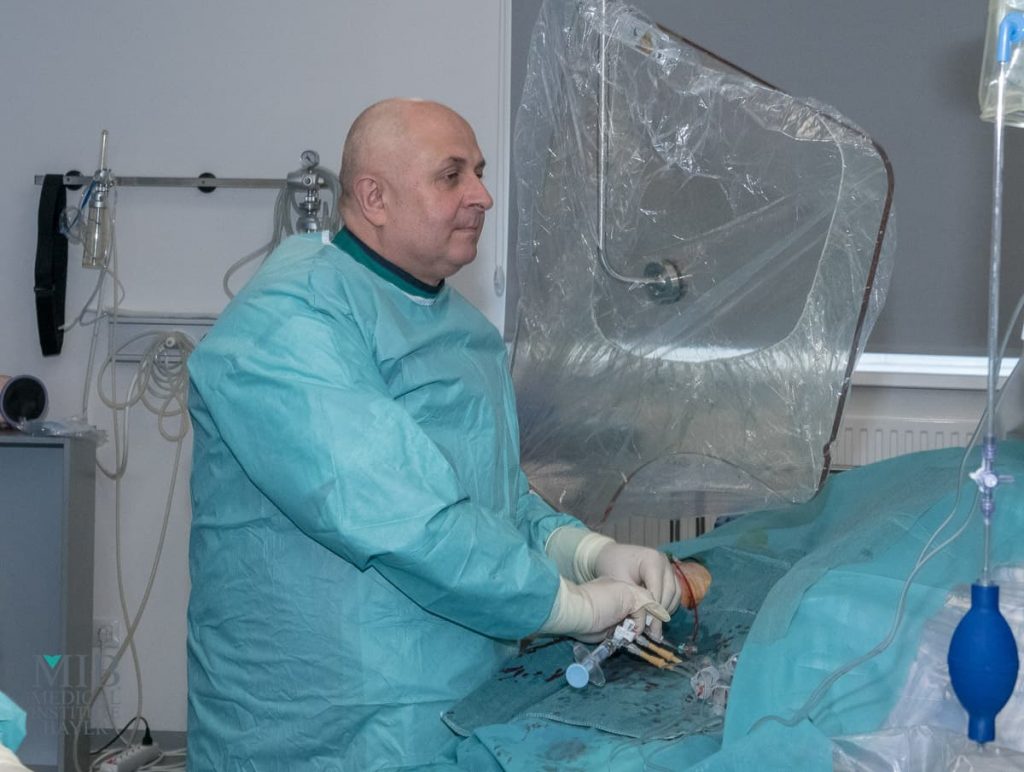Electrophysiological study and ablation

What is an electrophysiological study?
An electrophysiological study is a test that checks the electrical activity of the heart and the presence of cardiac arrhythmias. Disturbances in the electrical activity of the heart can cause palpitations or skipping of the heart, arrhythmias, dizziness or vertigo, and in extreme cases, death.
How is the procedure performed?
These procedures last on average 2-3 hours, but can last from 30 minutes to 6 hours, depending on the diagnosis and the procedure itself. It is performed on a table in an electrophysiology laboratory
(angio room). During the procedure, you lie on your back, and we carefully monitor all vital parameters
monitors, such as your blood pressure, EKG, blood oxygen level. The procedure is performed under local anesthesia (so you are awake during the procedure). After sterile preparation in your area, most often,
both groins, the doctor administers local anesthesia in that area, and then inserts plastic tubes into your blood vessels (veins or arteries). Through these tubes, cables (which doctors call “catheters”) are introduced to your heart, with which doctors monitor the heart’s electrical activity.
During the procedure, it is normal for you to feel palpitations, skip a beat, rapid heart rate or the occurrence of arrhythmia, which is why you are coming for the procedure. These are arrhythmias caused by doctors under controlled conditions and which should not worry you.
After the procedure, it is necessary to rest for about 4 hours, in order to prevent possible bleeding at the place of catheter placement.
Catheter ablation: Ablation is a procedure by which the so-called “frying” of the part of the heart that causes your arrhythmias, if the doctor finds them. Before the ablation, the doctor will always explain the following procedure and its risks. During ablation, the application of energy lasts 10-60 seconds. Most often you do not feel significant pain during the application of energy, although sometimes it is possible to feel heat in the chest. After the ablation is complete, the doctor will test again for the existence of your arrhythmia. During this time, you lie on the table for an additional 30 minutes, to confirm that the procedure was successful.
IMPORTANT FOR YOU AND YOUR FAMILY MEDICINE DOCTOR!
Preparation for the procedure:
You need to have basic blood tests no more than 30 days old, which include a complete blood count, electrolyte status, urea, creatinine, INR, blood group.
It is necessary to stop drinking antiarrhythmic drugs before the electrophysiological study, namely: flecainide, propafenone (Rytmonorm), sotalol (Darob), verapamil (Isoptin) 5 days before the procedure, and amiodarone (Cordarone, Amiokordin) 5 weeks before the procedure
You CONTINUE to take anticoagulant medications (also known as “blood thinners”) such as Farin, Sintrom, Marcumar, Xarelto, Eliquis until the day of the procedure. However, if you need additional information, contact our center
You MUST NOT eat or drink after midnight, the day before the procedure
Arrange transportation home the day after the procedure. YOU MAY NOT DRIVE BY YOURSELF FOR TWO DAYS.
Homecoming
After discharge from the hospital, reduce the level of your activities for the first 24 hours. Try not to strain or lift anything heavy for the next 2-3 days. After that, you return to normal life activities.
Do not worry if bruises appear on the groin at the injection site. They will recede in the next 3-4 weeks.
WHEN TO CALL THE DOCTOR? If the specified place becomes painful or a swelling suddenly appears on the groin.
We recommend returning to work 3-4 days after the procedure.
Risks of the procedure:
Electrophysiological study and ablation are generally quite safe procedures. Nevertheless, your doctor will additionally explain all possible complications. They include:
Bleeding at the injection site
Blood clot formation
The most significant complications, such as rapid arrhythmias that must be treated with electric shock, stroke, the need for implantation of a heart “pacemaker”, the need for emergency surgery, or death, are very rare and occur in less than 1% of cases.
FREQUENTLY ASKED QUESTIONS
Is the procedure painful?
The doctor will apply local anesthesia to the groin area, so you should not feel any pain. You may occasionally feel pressure in the said region. If you feel severe pain during the procedure, be sure to inform the doctor.
Am I awake during the procedure?
That. You can receive medication that will relax you, but you will not sleep during the procedure.
Do I need to do anything during the procedure?
During the procedure, you should lie still, stretch out your arms and legs. From time to time, the doctor will ask you if you feel arrhythmias.
How long do I stay in the hospital after the procedure?
After the procedure, if everything goes without complications, you go home the next day.
The first control after the procedure is in our center after 2-3 months, by which time you must do a 24-72h EKG Holter monitor.
WORKING HOURS
CONTACTS
- +387 35 309 100
- info@mib.institute
FOR PATIENTS

Zdravstvena ustanova Specijalna bolnica "Medical Institute Bayer" Tuzla već godinama zauzima lidersku poziciju u dijagnostici i tretmanu kardiovaskularnih bolesti u BiH i regionu.
USEFUL LINKS
FOR PATIENTS
Sva prava zadržava MIB

